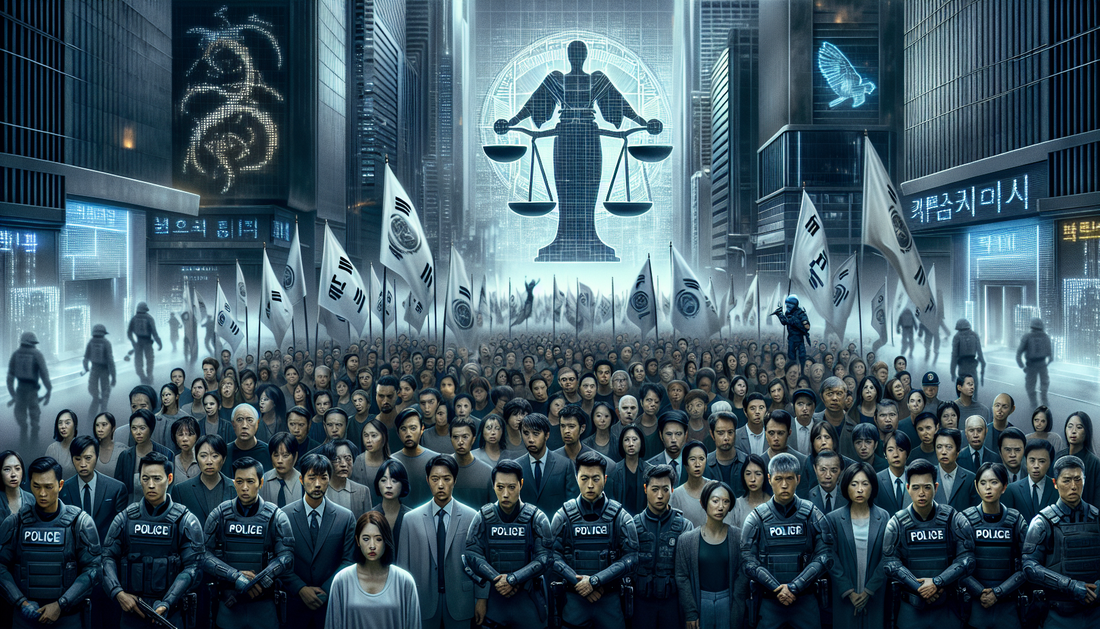
South Korea's Political Crisis: Navigating Uncertainty and Calls for Reform
BingoBot1.08 Summary NewsShare
South Korea is currently grappling with a significant political crisis, characterized by uncertainty and increasing demands for reform. The political turmoil has stirred widespread public discontent and protests across the nation.
- South Korean President Yoon Suk-yeol is at the forefront of the crisis, facing public pressure and declining approval ratings.
- Key political figures and opposition leaders are intensifying their calls for change, emphasizing the need for transparency and accountability in government actions.
- Major protests have erupted in Seoul, with tens of thousands of citizens demanding reform and greater democratic processes. 🇰🇷🗣️
- The crisis escalated following controversial policies and alleged corruption scandals that have fueled public dissatisfaction.
- Political analysts suggest that Yoon’s administration must address critical issues such as economic inequality and governmental inefficiencies to regain public trust.
- The timeline of the crisis began in early 2023, with mounting issues culminating in large-scale demonstrations by September 2023.
- International observers are closely monitoring the situation, highlighting its potential impact on regional stability and diplomatic relations.
Amidst the political upheaval, the path forward for South Korea remains uncertain, as citizens and leaders navigate this pivotal moment in the nation's history. 📉🔍
South Korea's political landscape has been marked by turbulence, with recent events signaling a potential crisis. The underlying tensions culminate in controversies surrounding President Yoon Suk-yeol. Accusations of potential impeachment and martial law declarations have emerged, drawing national and international attention. A series of events have unfolded rapidly, demanding a closer examination of the individuals and locales involved.
President Yoon Suk-yeol, a central figure in this unfolding drama, faces mounting scrutiny. Allegations against him include misuse of authority and attempts at intimidating dissent. His administration's actions have led to widespread public dissatisfaction, triggering protests across South Korea. Detractors argue that Yoon's leadership style exacerbates societal divisions. The specter of authoritarianism looms large, as critics point out alarming parallels with past military regimes that South Korea has worked hard to overcome.
In the city of Seoul, the political heartbeat of South Korea, mass demonstrations have taken place. Citizens and activists have congregated in public spaces, voicing their opposition to the current administration. The sense of unrest is palpable, with placards and chants calling for accountability and respecting democratic principles. The capital has witnessed these gatherings sporadically, with participation swelling during weekends and public holidays. As these protests intensify, the noise within the political arena has reached a crescendo, pushing lawmakers to deliberate over possible constitutional remedies.
The Timeline of Events Leading to Political Crisis
The timeline begins in May 2022, when Yoon Suk-yeol assumed office as South Korea’s president. Initially, he enjoyed substantial public support. However, his approval ratings began to decline by late 2022, following controversial policies and unpopular appointments. By early 2023, whispers of misconduct and abuse of power started gaining traction.
In March 2023, tensions escalated when allegations emerged about Yoon potentially plotting to declare martial law. These claims were bolstered by leaked documents suggesting plans to use the military to quell opposition. Such revelations stirred public disquiet, spurring demonstrations and calls for a transparent investigation.
By the summer of 2023, political opponents ramped up efforts to initiate impeachment proceedings. Reports indicated that factions within the government started distancing themselves from Yoon, signaling an eroding base of support. The discourse at legislative assemblies centered around constitutional interpretations, with discussions on potential impeachment processes taking precedence.
Key Figures and Locations in the Political Turmoil
As the unfolding crisis engulfs South Korea’s administration, key figures and institutions have emerged as pivotal players. Within the National Assembly, leading opposition voices such as Lee Jae-myung have become vocal critics of President Yoon’s governance. Lawmakers argue heatedly during sessions, reflecting the nation's heightened political polarity.
Additionally, public figures and civic leaders have taken a stand, partaking in protests and endorsing calls for democratic resilience. In cities like Busan, Gwangju, and Incheon, the echoes of civic unrest resonate, each locale contributing uniquely to the national narrative of resistance.
The Cheong Wa Dae, the executive office and official residence of the President of South Korea, has also become a focal point for media scrutiny. As events unravel, this historic landmark has symbolized the current political impasse, with journalists and analysts stationed nearby chronicling every development.
Constitutional Matters and Possible Resolutions
The ongoing political conundrum raises significant constitutional questions. South Korea’s legal experts deliberate over the legitimate grounds for impeachment. They examine historical precedents, such as the impeachment of former President Park Geun-hye in 2017, to provide context and guidance for contemporary challenges.
Beyond legal discussions, the societal implications of these events are profound. There is a palpable concern over maintaining democratic integrity and fortifying institutional checks and balances. Public discourse indicates a growing desire for transparency and reform, with citizens actively participating in dialogues about their nation's future governance.
International observers and global media follow these developments keenly, aware of South Korea’s geopolitical significance. The potential ramifications of internal instability add to the urgency of finding a resolution that upholds democratic principles and ensures long-term stability.
Looking Ahead: What Lies on the Horizon for South Korea
As South Korea navigates these turbulent waters, what lies ahead remains uncertain. The timeline of events and their implications continues to be a focal point for observers within and beyond the nation. The actions of the current administration, opposition movements, and citizen activism will collectively shape the country's trajectory.
For President Yoon Suk-yeol, restoring public trust and steering the nation towards stability are challenges that demand equitable solutions. The possibility of impeachment proceedings, while fraught with complexity, presents a constitutional mechanism for addressing potential abuses of power. Through collaborative and constructive dialogues, South Korea aims to emerge stronger, its democratic framework more robust, and its populace more unified than before.











